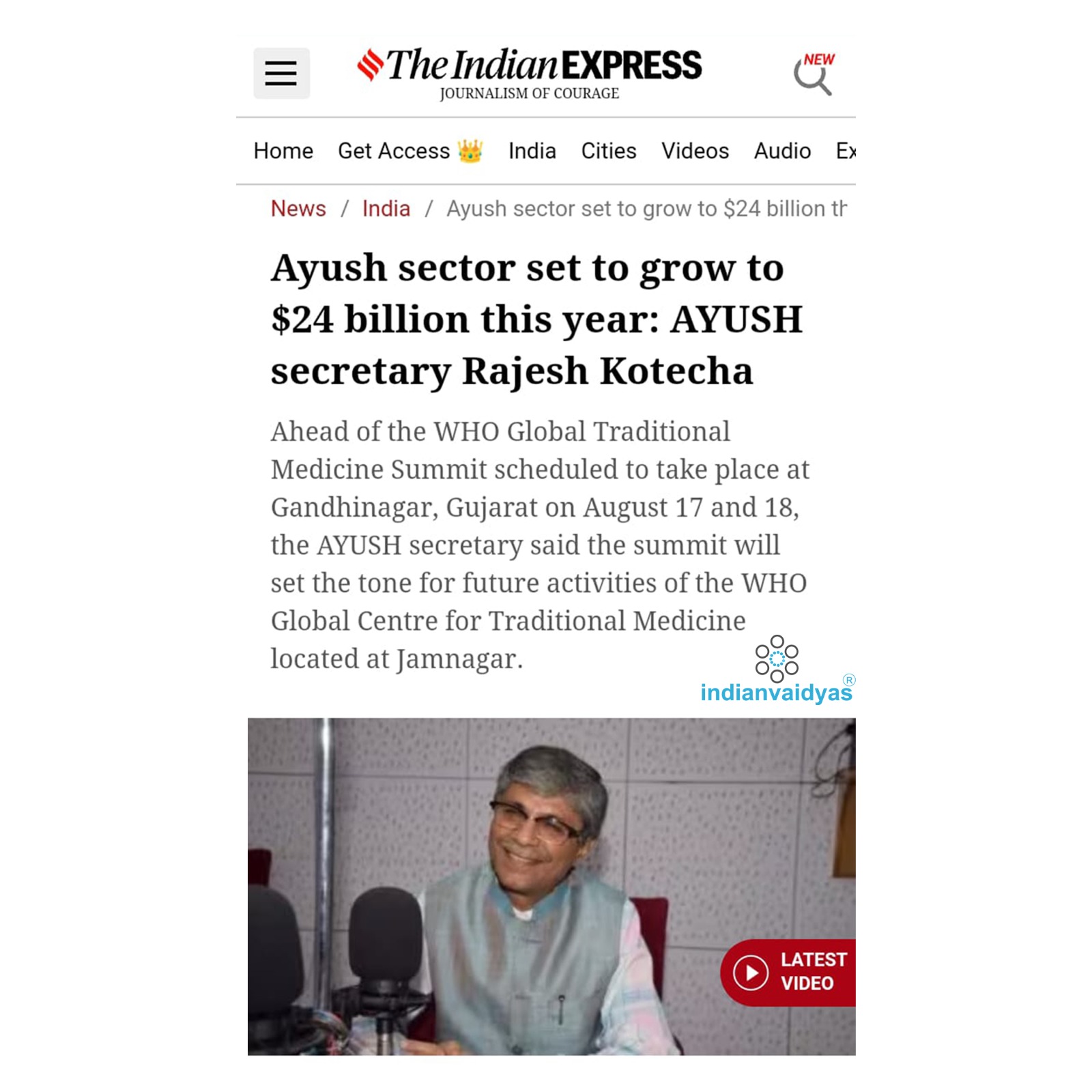Ayush sector set to grow to $24 billion this year: AYUSH secretary Rajesh Kotecha
17-Aug-23 04:54:43

Ahead of the WHO Global Traditional Medicine Summit scheduled to take place at Gandhinagar, Gujarat on August 17 and 18, the AYUSH secretary said the summit will set the tone for future activities of the WHO Global Centre for Traditional Medicine located at Jamnagar.
The production of Ayurveda, Yoga and Naturopathy, Unani, Siddha, and Homeopathy medicines and supplements has seen exponential growth from more than $3 billion in 2014 to $18 billion in 2020 and is anticipated to reach $24 billion in 2023, Rajesh Kotecha, secretary, Ministry of AYUSH, Government of India, told The Indian Express.
Ahead of the WHO Global Traditional Medicine Summit scheduled to take place at Gandhinagar, Gujarat on August 17 and 18, the AYUSH secretary said the summit will set the tone for future activities of the WHO Global Centre for Traditional Medicine located at Jamnagar.
The Global Summit is being co-hosted by the WHO and the Government of India which holds the presidency of the G20 in 2023.
According to Kotecha, experts from more than 90 countries will attend the summit and it will be a platform for all stakeholders including policymakers, academics, researchers, and the private sector to share best practices and evidence, data, and innovation on the contribution of traditional medicine to health and sustainable development.
“There is a huge response to the AYUSH-based health and wellness centres. Presently, 7,000 such centres are operational and data from states (Jan 1 to December 2022) indicate that 8.42 crore patients have availed of services,” Kotecha said.
At the Summit, the WHO will present emerging findings from the third global survey on traditional medicine, which, for the first time, includes questions on the financing of traditional and complementary medicine, health of indigenous peoples, quality assurance, traditional medicine knowledge, biodiversity, trade, integration, patient safety, and more. The complete survey, which will be released later in the year, first on an interactive online dashboard and then as a report, will inform the development of WHO’s updated traditional medicine strategy 2025-2034 as requested by the World Health Assembly in May 2023.
Earlier, the WHO had appointed 11 experts in traditional medicine, public health, and policy including former UGC vice chairman Bhushan Patwardhan as a co-chair to its external advisory group to provide strategic and technical advice for the maiden Global Traditional Medicine Summit. The other co-chair is L Susan Wieland, Director of Cochrane Complementary Medicine, USA.
When contacted via email, Dr Shyama Kuruvilla, WHO lead for the Global Traditional Medicine Centre and the Summit, told The Indian Express that the WHO is working with its member states on standards and benchmarks for different traditional medicine systems and their evidence-based integration in the International Classification of Diseases (ICD). The ICD allows countries to count and identify their most pressing health issues, and it does not include, refer to, or endorse any therapy.
“The inclusion of a supplementary chapter on traditional medicine conditions in ICD will, for the first time, enable counting of traditional medicine services and encounters, measurement of their form, frequency, effectiveness, safety, quality, outcomes, and cost. It will inform regulations, and allow comparison with mainstream medicine and research due to standardised terms and definitions nationally and internationally,” Dr Kuruvilla said.
Dr Kuruvilla also pointed out that around 40 per cent of pharmaceutical products today have a natural product basis, and landmark drugs derive from traditional medicine. “Taking clues from traditional uses, new clinically effective drugs can be identified through research methods such as ethnopharmacology and reverse pharmacology. Artificial intelligence (AI) has emerged as a game-changer, revolutionizing the study and practice of traditional healing systems – AI’s advanced algorithms and machine-learning capabilities can allow researchers to explore extensive traditional medical knowledge, map evidence, and identify once elusive trends,” Dr Kuruvilla added.